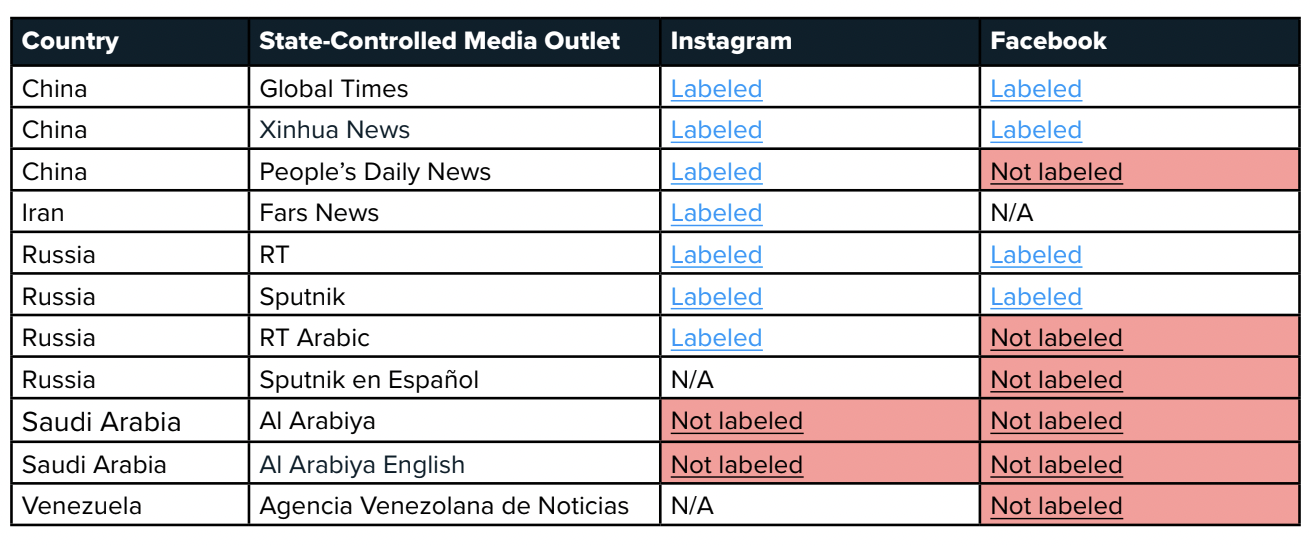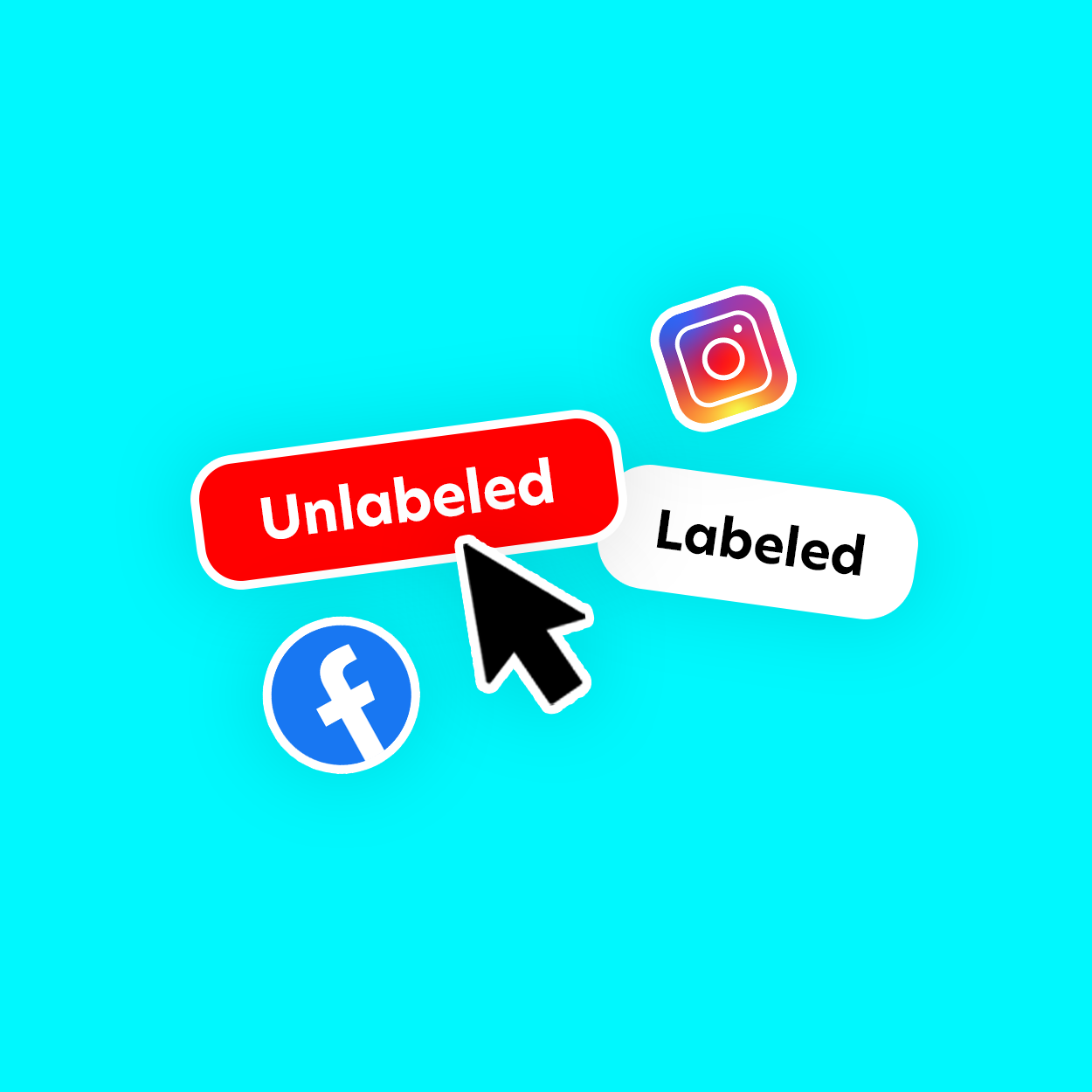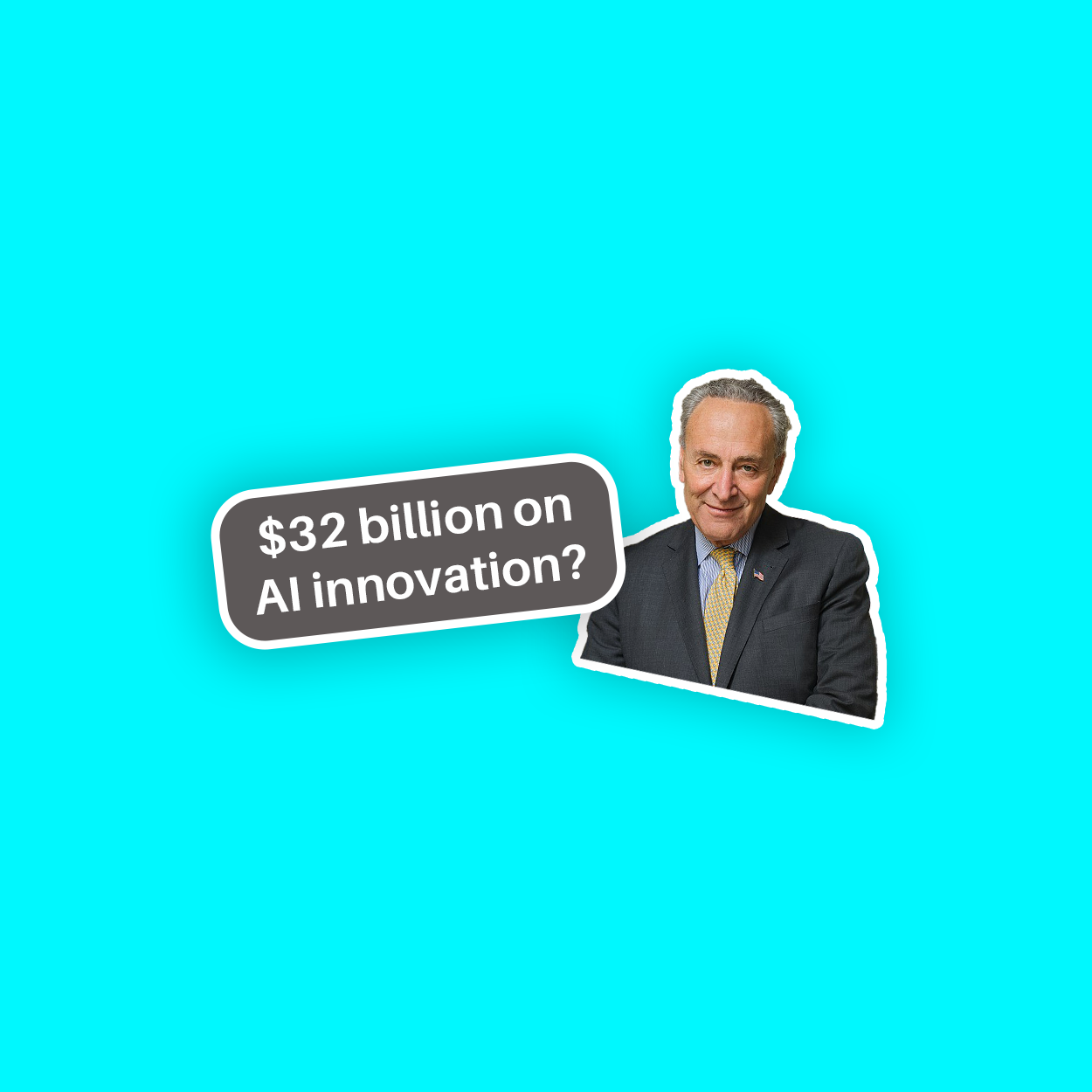SUMMARY
To better understand the election preparedness landscape illustrated in our recent Democracy by Design: Social Media Scorecard, Accountable Tech is investigating where platforms are failing to meet their own election integrity policies.
Meta’s Instagram and Facebook both have policy commitments to label accounts of state-controlled media outlets, but they are not fully living up to their own policies.
Instead, Instagram and Facebook are inconsistently labeling state-controlled media outlets; additionally, even when they do append a label, the design of the labels is not always prominent enough to draw attention, nor is it linked to authoritative sources.
Labeling works. According to research published last year, when social media users notice labels for state-controlled media outlets of authoritarian governments like China or Russia, they are less likely to engage with that content. Across the state-controlled outlets we examined on social media platforms, there are millions of followers who may or may not know that these accounts are under state-control.
With foreign governments attempting to sway American public opinion ahead of the November 2024 election, social media companies have an obligation to clean up their act, meet their own policy commitments, and take immediate steps to further protect the integrity of our elections.
KEY FINDINGS AND PLATFORM PERFORMANCE

A few of the unlabeled accounts – some of which were also verified by Facebook – have large followings:
- Al Arabiya has 31 million followers on Facebook and 4.9 million followers on Instagram
- Al Arabiya English has 1.6 million followers on Facebook
- RT Arabic has 685k followers on Facebook
ANALYSIS OF THE PLATFORMS’ LABELING POLICY VS PRACTICE
Meta’s State-Controlled Media Labeling Policy does not appear to have been updated since 2021, although it was referenced in their 2023 post about preparations for the 2024 elections. Instagram’s specific policy indicates that state-controlled media accounts are held “to a higher standard of transparency because we believe they combine the influence of a media organization with the backing of a state.”
In September 2020, Meta started adding labels to Instagram posts and profiles. Instagram’s labels are fairly small and difficult to discern – mostly positioned in small text under the account name.
While labels are not obviously hyperlinked, they are clickable and, when selected, produce a pop-up that says a little about the label. Clicking “learn more” does not lead to an authoritative source but rather a page about Instagram’s state-controlled media policy.

Selecting “see more about this account” shows some details about the Instagram page.
Some of the state-controlled media outlets have a blue verification mark. As noted above, we did find accounts that appeared to be affiliated with state-controlled media outlets that were unlabeled but also unverified – including Al Arabiya.
We also found accounts that appear to be unofficial but use the logo and name of state-controlled media accounts while remaining unlabeled despite posting content from the official outlet. Examples include @Russian_Today_ and @Int_Fars, which has many more followers and, as noted, frequently collaborates with the labeled @Fars_News.
Although Meta’s policy states that labels appear on Pages, in the Page Transparency section, and in Feed, our review found that Feed labels are not particularly prominent.
On the Facebook app, the label cannot be seen on the main page for an account unless the “about” section is selected.
Where accounts are labeled in Facebook’s Feed section, only small text that says “[country name] state-controlled media” is included. Like on Instagram, the information provided from the pop-up when the label is selected is limited.

“Learn More” links to Facebook’s Help Center and explains the policy.
After following state-controlled media accounts, we found that Facebook sends emails to users about these pages to prompt platform engagement. The emails do not include snippets of content but do indicate that there are unread notifications and prompt users to open the app to see the content. Upon clicking through, unlabeled content appears:

METHODOLOGY
We identified state-controlled media outlets from China, Iran, Russia, Saudi Arabia, and Venezuela that fit criteria based on analysis from State Media Monitor’s Media and Journalism Research Center.
Next, we created new accounts on Instagram and Facebook to search for pages associated with each of the following:
- RT
- Sputnik
- China Xinhua News
- Global Times
- People’s Daily News
- Al Arabiya
- Fars News
- Agencia Venezolana de Noticias
Although we did not find all eight outlets on both of the platforms, we did find affiliated accounts such as @sputnikmundo and RT Arabic. We followed, liked, or subscribed to the state-controlled accounts we did find and analyzed how content was labeled for each on both mobile and desktop.
Our primary focus was to evaluate the extent of the labeling of these accounts: where labels are applied, what warning language labels include, what (if any) authoritative sources are cited, how users might interact with the labels, and how prominent the labels are for the user. We also noted key political narratives that emerged during our research and paid attention to design features like recommendations or other prompts that might keep users engaged with such content.
CONCLUSION
Meta promises to label the account pages and contents from state-controlled media outlets in Feed and says that ads from these accounts will be blocked from targeting people in the U.S. However, in addition to our findings on the inconsistency of their own labeling, we found that content from these outlets may be flourishing in groups with the same names as the outlets (i.e. RT Noticias Internacionales en Español) on Facebook. In other words, Meta is doing far too little to inform users who may be interacting with or even spreading state propaganda.
Overall, labels are missing for major state-controlled outlets, are not prominent when they do appear, and largely lack additional context to inform the user. As state-controlled media is building a larger presence on social media ahead of the U.S. elections this November, the platforms have a responsibility to live up to their commitments and keep users informed about the provenance of the media on their sites.








